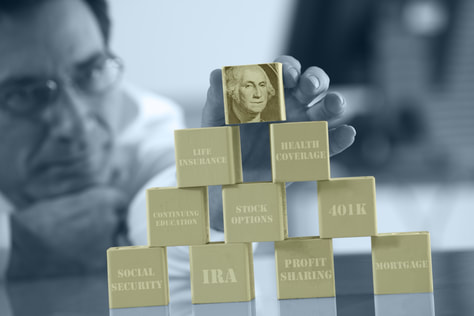 I have heard debt defined as work you have yet to do. Thinking of debt in this way highlights the need to be debt free in retirement. If retirement is to be a time when you no longer exchange labor for a paycheck, then you do not want ‘work you haven’t done yet’ to be in the equation. Carrying consumer debt like credit cards and home equity loans is the biggest no-no. It is important to remember that the safest and easiest way to earn 12% to 18% on your money is to not pay 12% to 18% for your money. Home mortgages are not as bad as consumer debt since you are financing an asset that will likely appreciate, or at least keep even with inflation. However, if you can eliminate that monthly payment you will find you can sleep better when you reach your retirement years. The two most common objections I have run into when recommending clients pay off a mortgage are: 1) They like the mortgage interest deduction when they file their income tax return 2) They like the security of having a large balance in their savings accounts. To which I explain: 1) The mortgage interest deduction only reduces the effective interest rate you pay, it does not eliminate it. Plus, your marginal income tax rate is likely to be lower during your retirement years anyway. 2) You are likely earning less on your savings than you are paying in mortgage interest, and even if you invested the money, you then end up with more assets at risk to market fluctuations during a part of your life when lowering your exposure to risk makes sense. Having a reasonable budget and the discipline to live within it is equally critical to your happiness and peace of mind during both accumulation and retirement phases. Having no mortgage keeps your monthly expenses low and which makes living within your means during retirement much easier. If all you really have to worry about is paying taxes, insurance, utilities, and for food you will find less stress in your life. So, based on your anticipated retirement date, you should develop a plan to eliminate as much debt and monthly payments as possible. It is much easier to develop and implement a plan in the years leading up to retirement than it is to address these needs after you have retired. If you need help developing a debt elimination plan, then reach out to us here at Oak Street Advisors, we have decades of experience helping pre-retirees fine tune their finances to make retirement less stressful and more enjoyable. Get Out of Credit Card Debt: Stop Giving Away Your MoneyPart of Oak Street Advisors’ 10 Financial Commandments for Millennials series, getting out of credit card debt is a crucial component for younger investors to get ahead. Interest payments can absolutely destroy your personal finances while often draining a debtors’ mental well-being as well. When used responsively, credit cards can offer convenience, flexibility, and lucrative rewards. When used inappropriately they can lead to life-changing negative consequences including bankruptcy and divorce. Therefore, getting out of credit card debt is the second step in our 10 Financial Commandments for Millennials series.
Americans topped $1 trillion in credit card debt in 2017. At a 15.5% average interest rate, you don’t need to even run the numbers to know that’s a lot of money paid to the credit card companies. Average credit card debt is around $6,500 and climbing. Needless to say, if you’re in an uncomfortable situation with credit card debt just know you’re certainly not alone. So, how do you start to dig your way out of credit card debt? First and foremost, move as much debt as you can to a 0% card or account. You may have to open two 0% APR cards to do so, but you want to ensure you pay the least amount of interest on this debt as possible. Preferably you can find a card or transfer offer that doesn’t include a balance transfer fee. However, if you have to pay that fee understand that the money you’ll save on interest payments alone will more than make up for the 3% or so balance transfer fee. If you’re able to move the debt to a 0% card then calculate how much you need to pay each month to pay off the card by the time the zero interest period ends. If you can’t pay off the card in the allotted time frame, you still may be able to roll that balance onto another 0% card in a year or two when your current card’s 0% introductory rate expires. If you can’t get everything moved to an interest free credit card, you’ll need to start paying down your debt the old-fashioned way: being disciplined in your spending and allocating as much monthly income to your credit cards as possible. To do so, you can choose from one of the following methods: 1) Avalanche Method This method is best mathematically. The Avalanche Method dictates you pay all the minimums on your credit cards. Next, you throw as much extra money as possible at the highest interest rate account. This saves you the most money over time, but often can take a long time to pay off a single account which can be mentally and emotionally taxing. If you’re dedicated to crushing debt, saving the most on interest payments and will be extremely disciplined in tackling this problem then the avalanche method should be considered. 1) Snowball Method This method suggests that you pay all your credit card minimums just as the previous strategy, only instead of paying everything you can towards the highest balance account you take all extra payments and send them to the smallest account balance. You will pay more interest than the latter method, but eliminating the little accounts first provides debtors with small mental and emotional victories when an account is paid in full. In our experience this leads to a more motivated client who gains momentum with every account that is erased. While mathematically inferior, our advisors recommend clients utilize the Snowball Method. The small mental victories really power people through their debt elimination strategy and generally tend to keep people better on track. Of course, you can sit down with an independent advisor at Oak Street Advisors to discuss the best option to achieve your personal financial goals. If you’re tired of dealing with credit card debt on your own you can also check out our Fiscal Checkup which can be focused on restructuring and then eliminating your credit card debt with a financial planner. |
Archives
April 2024
Categories
All
|


 RSS Feed
RSS Feed